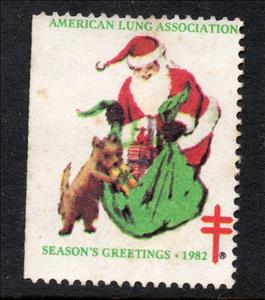Stamp: American Lung Association (Cinderellas 1977)
American Lung Association (Cinderellas 1977)
01 January (Cinderellas ) within release U.S.A. goes into circulation Stamp American Lung Association face value None No Face Value
| Stamp American Lung Association in catalogues | |
|---|---|
| Colnect codes: | Col: US 1982-002 |
Stamp is vertical format.
SEASON'S GREETINGSAlso in the issue U.S.A.:
- Stamp - American Lung Association face value None;
- Stamp - American Lung Association face value None;
- Stamp - American Lung Association face value None;
- Stamp - American Lung Association face value None;
- Stamp - American Lung Association face value None;
- Stamp - American Lung Association face value None;
- Stamp - American Lung Association face value None;
- Stamp - American Lung Association face value None;
- Stamp - American Lung Association face value None;
- Stamp - American Lung Association face value None;
- Stamp - American Lung Association face value None;
- Stamp - American Lung Association face value None;
- Stamp - American Lung Association face value None;
- Stamp - American Lung Association face value None;
- Stamp - American Lung Association face value None;
- Stamp - American Lung Association face value None;
- Stamp - American Lung Association face value None;
- Stamp - American Lung Association face value None;
- Stamp - American Lung Association face value None;
- Stamp - American Lung Association face value None;
- Stamp - American Lung Association face value None;
- Stamp - American Lung Association face value None;
- Stamp - American Lung Association face value None;
- Stamp - American Lung Association face value None;
- Stamp - American Lung Association face value None;
- Stamp - American Lung Association face value None;
- Stamp - American Lung Association face value None;
- Stamp - American Lung Association face value None;
- Stamp - American Lung Association face value None;
- Stamp - American Lung Association face value None;
- Stamp - American Lung Association face value None;
- Stamp - American Lung Association face value None;
- Stamp - American Lung Association face value None;
- Stamp - American Lung Association face value None;
- Stamp - American Lung Association face value None;
- Stamp - American Lung Association face value None;
- Stamp - American Lung Association face value None;
- Stamp - American Lung Association face value None;
- Stamp - American Lung Association face value None;
- Stamp - American Lung Association face value None;
- Stamp - American Lung Association face value None;
- Stamp - American Lung Association face value None;
- Stamp - American Lung Association face value None;
- Stamp - American Lung Association face value None;
- Stamp - American Lung Association face value None;
- Stamp - American Lung Association face value None;
- Stamp - American Lung Association face value None;
- Stamp - American Lung Association face value None;
- Stamp - American Lung Association face value None;
- Stamp - American Lung Association face value None;
- Stamp - American Lung Association face value None;
- Stamp - American Lung Association face value None;
Stamp American Lung Association it reflects the thematic directions:
help, especially in the form of money, given freely to people who are in need, for example because they are ill, poor, or have no home, and organizations that provide this help: She does a lot of work for charity.
Christmas or Christmas Day (Old English: Crīstesmæsse, meaning "Christ's Mass") is an annual festival commemorating the birth of Jesus Christ, observed most commonly on December 25 as a religious and cultural celebration among billions of people around the world. A feast central to the Christian liturgical year, it is prepared for by the season of Advent or the Nativity Fast and initiates the season of Christmastide, which historically in the West lasts twelve days and culminates on Twelfth Night; in some traditions, Christmastide includes an Octave. The traditional Christmas narrative, the Nativity of Jesus, delineated in the New Testament says that Jesus was born in Bethlehem, in accordance with messianic prophecies; when Joseph and Mary arrived in the city, the inn had no room and so they were offered a stable where the Christ Child was soon born, with angels proclaiming this news to shepherds who then disseminated the message furthermore. Christmas Day is a public holiday in many of the world's nations, is celebrated religiously by the vast majority of Christians, as well as culturally by a number of non-Christian people, and is an integral part of the holiday season, while some Christian groups reject the celebration. In several countries, celebrating Christmas Eve on December 24 has the main focus rather than December 25, with gift-giving and sharing a traditional meal with the family.
The domestic dog (Canis lupus familiaris or Canis familiaris) is a member of genus Canis (canines) that forms part of the wolf-like canids, and is the most widely abundant carnivore. The dog and the extant gray wolf are sister taxa, with modern wolves not closely related to the wolves that were first domesticated. The dog was the first domesticated species and has been selectively bred over millennia for various behaviors, sensory capabilities, and physical attributes. Their long association with humans has led dogs to be uniquely attuned to human behavior and they are able to thrive on a starch-rich diet that would be inadequate for other canid species. Dogs vary widely in shape, size and colours. Dogs perform many roles for people, such as hunting, herding, pulling loads, protection, assisting police and military, companionship and, more recently, aiding handicapped individuals. This influence on human society has given them the sobriquet "man's best friend".
Santa Claus (also known as Saint Nicholas, Saint Nick, Father Christmas, Kris Kringle or Santa) is a legendary figure originating in Western Christian culture who is said to bring gifts during the late evening and overnight hours on Christmas Eve. Christmas elves are said to make the gifts in Santa's workshop, while flying reindeer pull his sleigh through the air




